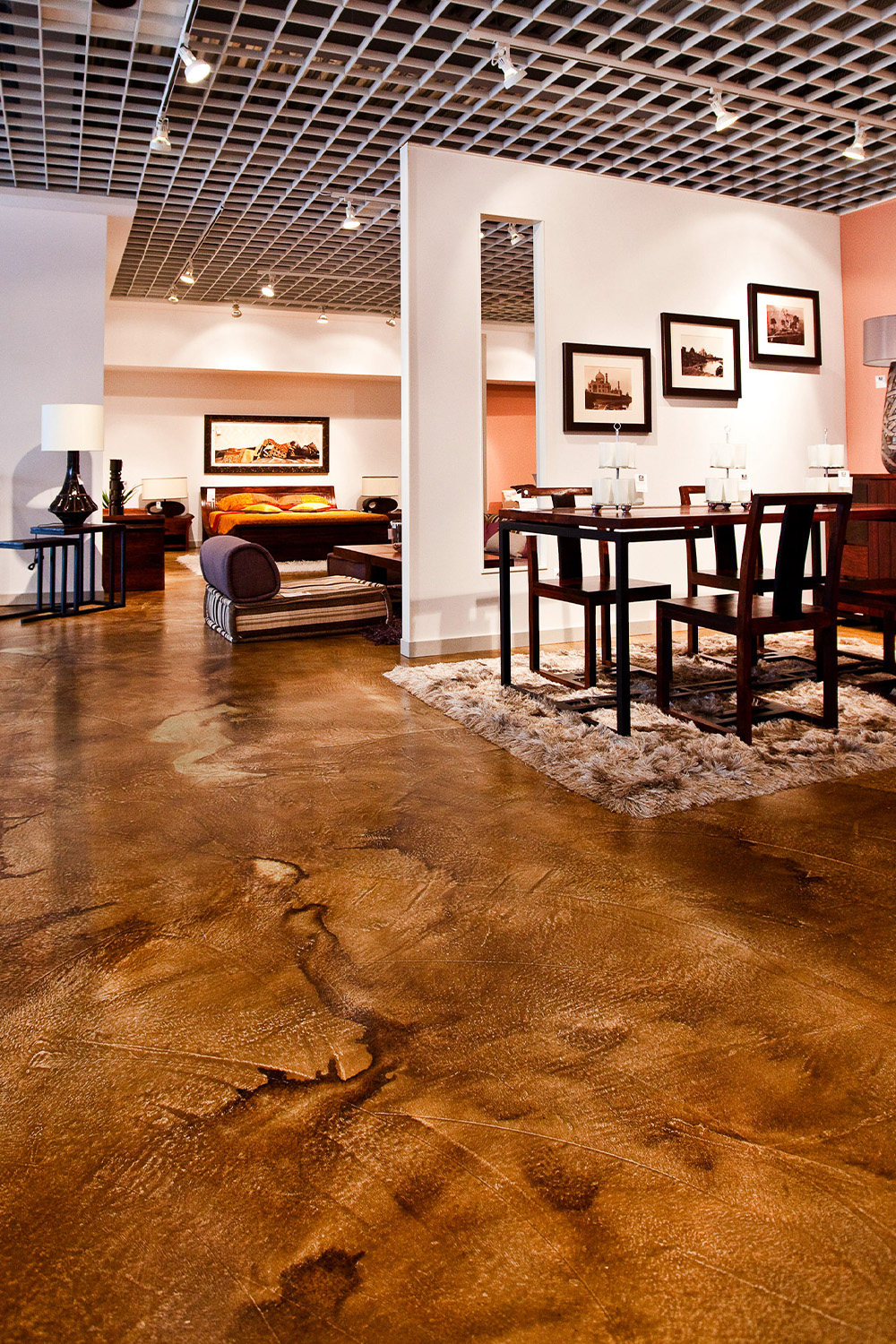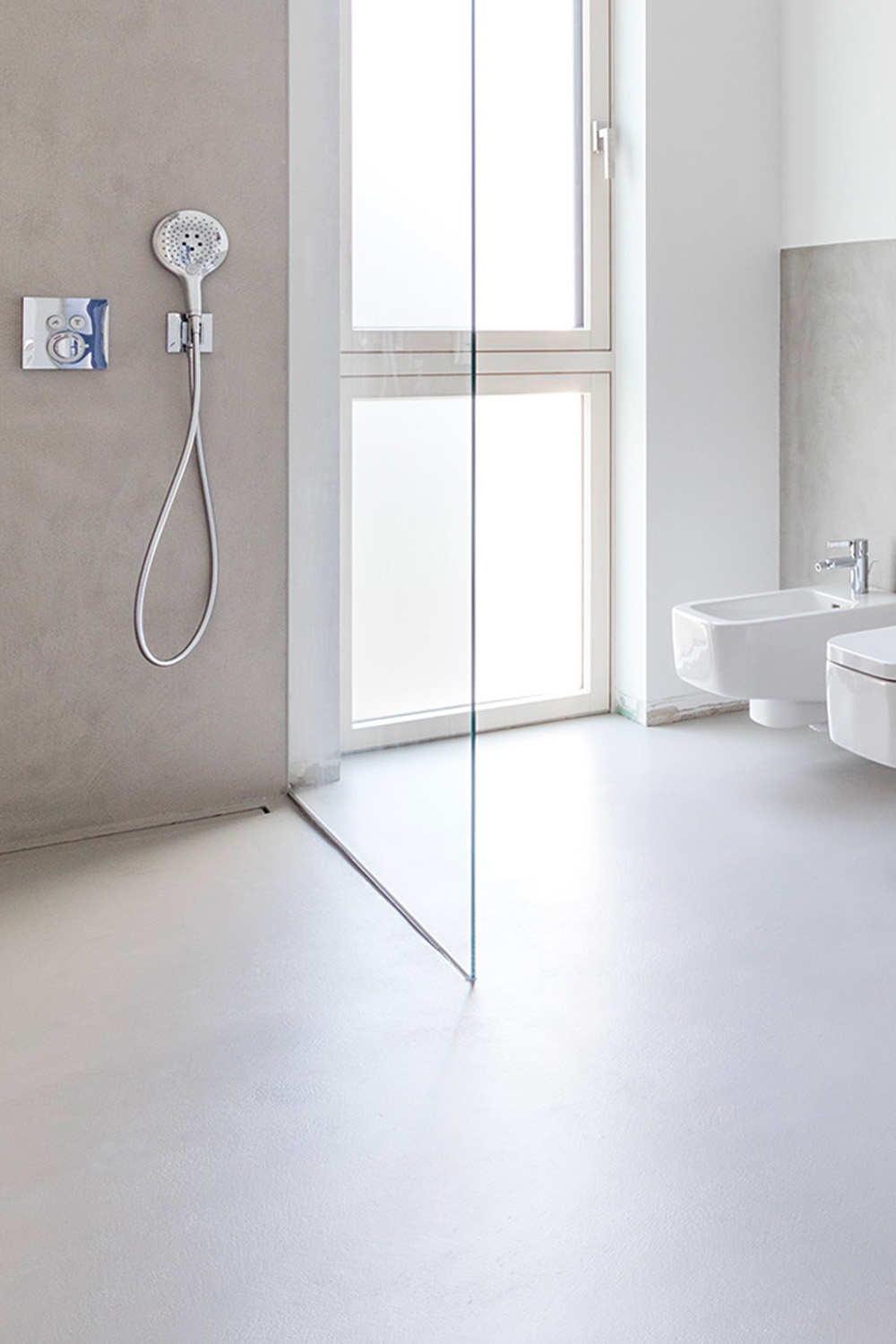Floors are an essential and critical component for the industrial sector as well as for any production environment. Not only must these floors guarantee safety and resistance to various mechanical, chemical and thermal stresses, they must also comply with current regulations.
But what are industrial floors? What characteristics must they have?
What are industrial floors?
Industrial floors are surfaces specifically designed and built to withstand the harsh working conditions typical of manufacturing environments. Unlike residential or commercial floors, industrial floors must withstand heavy loads, heavy vehicle and foot traffic, exposure to chemicals, and often extreme temperatures. These floors are found in a wide range of industries, including the following sectors:
– Manufacturing
– Logistics
– Food
– Pharmaceutical
– Chemical
– Automotive
– Electronics
Each sector has specific needs that influence the choice of the most suitable type of flooring.
Main features of industrial floors
Mechanical resistance
One of the main characteristics of industrial floors is their mechanical resistance. These floors must be able to withstand industrial machinery, heavy vehicles and handling equipment. Resistance to abrasion and impacts is essential to ensure durability over time and minimize maintenance and repair costs.
Materials used
Materials commonly used to ensure high mechanical resistance include:
– Reinforced concrete: Often reinforced with metal or polymer fibers to improve impact and compressive strength.
– Epoxy coatings: They provide a hard, abrasion-resistant surface.
– Polyurethane coatings: They provide a reasonable combination of mechanical strength and flexibility, and are therefore useful in environments subject to thermal variations.
Chemical resistance
In many sectors, industrial floors are exposed to aggressive chemicals. It is essential that the materials used are resistant to these agents to avoid deterioration that could compromise the safety of workers and the functionality of the work environment.
Chemical risk sectors
– Chemical industry: it requires floors that can resist acids and solvents.
– Food industry: it requires resistance to detergents and disinfectants used for cleaning.
– Pharmaceutical industry: it requires floors that are resistant to chemicals and are easy to sanitize.
Anti-slip safety
To ensure worker safety, floors must have anti-slip properties. This is particularly important in environments where liquid spills may occur or where humidity is present. Anti-slip surfaces can be obtained by
– Surface treatments: such as the use of anti-slip paints or coatings with abrasive inserts.
– Surface texture: such as the use of embossed floors.
Easy maintenance and cleaning
Ease of maintenance and cleaning is another key factor. Industrial floors must be designed to facilitate the removal of dirt, dust and processing residues, while maintaining a hygienic and safe environment.
Regulatory compliance
In Italy, industrial floors must comply with a series of regulations regarding safety, hygiene and the environment. Some of the main regulations include the following:
– UNI standards specify the technical requirements that floors must meet in terms of mechanical and chemical resistance, and anti-slip properties.
– European EN standards concern aspects such as fire safety, wear resistance and durability of materials.
– HACCP regulations: in the food sector, HACCP (Hazard Analysis and Critical Control Points) regulations establish hygiene and cleaning criteria that floors must meet.
Designs for every industrial sector
Manufacturing sector
In the manufacturing industry, floors must withstand heavy loads and chemicals used in production processes. Reinforced concrete floors are often the preferred choice due to their durability and chemical resistance.
Typical applications:
– Factories with heavy machinery, which require floors that can withstand the weight of the machinery and forklift traffic.
– Factories with substance use, which require floors able to withstand high temperatures and corrosive chemicals.
Logistics sector
For warehouses and distribution centres, resistance to wear and tear from forklift and vehicle traffic is essential. Concrete floors with anti-abrasion surface treatments are commonly used.
Typical applications
– Storage warehouses must have smooth, durable floors to facilitate the movement of pallets and forklifts.
– Distribution centres require non-slip surfaces to ensure safe loading and unloading of goods.
Food sector
In the food industry, hygiene is essential. Floors must be easy to clean and resistant to chemicals used for sanitization. Certain coatings are often used for their chemical resistance and ease of maintenance.
Typical applications
– Food processing plants require seamless, waterproof floors to prevent bacteria build-up.
– Slaughterhouses and meat processing plants require floors that are resistant to grease and organic acids.
Pharmaceutical sector
Hygiene is also a priority in the pharmaceutical sector. Floors must be resistant to chemicals and easy to sanitize. They must also be antistatic to avoid dust accumulation.
Typical applications
– Research labs require chemical-resistant and easy-to-clean floors.
– Production areas require smooth, anti-static surfaces to avoid contamination.
Chemical industry
In the chemical industry, floors must be able to withstand a wide range of aggressive chemicals. The materials used must be highly resistant to corrosion.
Typical applications
– Chemical plants require floors that can withstand acids, bases and solvents.
– Analysis laboratories require floors that are easy to clean and resistant to chemical reagents.
Automotive sector
In the automotive industry, floors must withstand heavy loads, oils and chemicals. Concrete floors are ideal for this environment.
Typical applications
– Machine shops require floors that are resistant to oils and lubricants.
– Assembly line require smooth, durable surfaces to facilitate the movement of vehicles and equipment.
Electronics sector
In the electronics industry, floors must be antistatic to avoid damage to sensitive components.
Typical applications
– Cleanrooms require anti-static and easy-to-clean floors.
– Assembly areas require smooth and chemical-resistant surfaces.
Safety and efficiency
Floors can be an essential component to ensure safety, durability and efficiency in various manufacturing sectors. Their specific characteristics — such as mechanical resistance, chemical resistance and anti-slip properties — must be carefully considered during the design step. Furthermore, it is essential that these floors comply with current regulations to ensure a safe and standard-compliant working environment. Choosing the right flooring for each sector can make a difference in terms of longevity, safety and functionality of industrial facilities. Investing in the right flooring solution means investing in the future of the company, ensuring smooth and uninterrupted operations.
Ideal Work offers different solutions suitable for various industrial environments, characterized by high resistance, versatility and ease of maintenance. Here are some of the most relevant ones.

1. Nuvolato Architop®
Nuvolato Architop® is a concrete solution ideal for industrial floors. It can be applied with a minimal thickness (3-4 mm) and ensures high resistance to wear and abrasion, which are essential requirements for high-traffic industrial environments. Furthermore, it can be easily customized through a wide selection of colours and finishes, and it can be treated with an acidification technique to obtain unique decorative effects. Its seamless surface facilitates cleaning and maintenance.

2. Acid-Stain
Ideal Work’s acid-stain offers an exclusive finish for a resistant decorative surface. This type of floor is treated with acids to create permanent and unique colour effects that do not deteriorate over time. It is suitable for environments where special chemical and mechanical resistance is required.

3. Stamped Concrete
Stamped concrete is another Ideal Work solution that combines the practicality of concrete with an attractive appearance. This type of flooring is suitable for external application and it can reproduce the appearance of natural stone, ceramic or wood, while maintaining the unparalleled mechanical properties of concrete.

Protective treatments
To ensure the longevity and resistance of industrial floors, Ideal Work offers various protective treatments:
– PETROTEX-S: A water and oil repellent acryl-silose product, ideal for protecting concrete surfaces.
– AQUAPEL-S: A water-repellent sealer that penetrates concrete, making it highly resistant to moisture and salt.
Ideal Work solutions for industrial floors – Nuvolato Architop®, Acid-stain and Stamped Concrete – provide resistance, ease of maintenance and broad custom possibilities. These characteristics make them suitable for a wide range of industrial sectors, ensuring compliance with Italian regulations and durability over time.
For more details on specifications and application, please contact us.